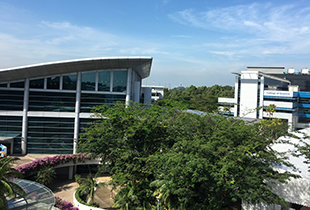06.06.2017
NTU and Germany’s Fraunhofer launch new institute to develop digital solutions for the industry
Nanyang Technological University, Singapore (NTU Singapore) and FraunhoferGesellschaft (Fraunhofer), a renowned German institution for applied research, are launching a research institute to develop digital technologies to help companies move into the digital era and remain competitive.
These include virtual and augmented reality technologies that will, for example, allow engineers to run diagnostics on machinery using real-time infographics presented in 3D on hand-held tablets, or to review virtually created products using virtual reality glasses before starting on actual production.
Located at NTU, the new Fraunhofer Singapore institute is also working with the BMW Future Mobility Lab at NTU to improve driving safety. Researchers will develop human-machine interfaces that detect drivers’ emotions, attention span, fatigue as well as facial expressions.
The data can then be displayed on windscreens or visual cockpits of future cars, prealerting drivers of their condition to prevent any accidents from occurring.
Mr S Iswaran, Singapore’s Minister for Trade and Industry (Industry) launched the institute today, which aims to advance a manufacturing paradigm known as Industry 4.0 where Singapore companies incorporate data analytics, industrial internet of things (IIoT), and automation into their manufacturing processes.
NTU President Professor Bertil Andersson said, “While we move from Gutenberg to Google in education, our industries are also doing away with the assembly line and welcoming cloud computing and automation. This new institute at NTU will create an ecosystem of technologies targeted for use by companies, and provide new training platforms for Singapore’s next-generation workforce.”
Supported by funding from industry partners and with funding of up to $23 million from the National Research Foundation (NRF), the new institute will boost Singapore’s Smart Nation ambitions, and promote the adoption of digital technologies across all sectors of the economy.
NRF CEO Professor Low Teck Seng said, “The current dramatic shift to a digital economy underscores the importance for Singapore companies to remain ahead by using technology to continually reinvent the way they do business and train their workers. Our support of the Fraunhofer Singapore institute represents another step forward in using research in digital areas such as visual analytics, virtual and augmented reality and human-computer interaction to add value to work processes and training in our companies.”
NTU Professor Karl Wolfgang Mueller-Wittig, Director of Fraunhofer Singapore, said, “The long-term collaboration with NTU and the strong support of NRF were the foundation to achieve this milestone. I’m happy to see the substantial implementation of the Fraunhofer model in Singapore delivering visual solutions with impact on industry and society.”
Fraunhofer IGD Director Professor Dieter Fellner, said, "It is increasingly important for the Fraunhofer-Gesellschaft to be present at key locations world-wide. The building blocks for such a successful internationalisation strategy are the collaboration with the best in science and the specific extension of competencies with added value for Germany and Singapore."
Fraunhofer Singapore builds on NTU’s two-decade long partnership with Germany’s Fraunhofer-Gesellschaft. It is Europe’s leading application-oriented research organisation, which has more than 69 research units throughout Germany.
The new institute will continue to work on research projects undertaken by the Fraunhofer Interactive Digital Media (IDM) at NTU that was opened in 2010. These range from multi-touch screen panels to mobile applications with augmented reality technology.
For example, one of the existing projects allows a user to point a mobile phone camera at a building to display its history and read up on its architecture.
It is also developing solutions to benefit the public sector, in areas such as healthcare education. Fraunhofer is working with NTU’s Lee Kong Chian School of Medicine in the development of anatomy teaching.
Together, they are exploring the development of new imaging modalities. Interactive learning models could aid students in grasping key anatomical concepts and has the potential to play an important role in medical education at NTU.
The institute also aims to advance industrial training methods to make it easier to learn about complex machinery. For example, instead of a thick manual, engineers can 3 learn how to maintain a jet engine on the job by using an app on their mobile phones, with a step-by-step guide in augmented reality.
Apart from projects focusing on virtual reality and augmented reality, the centre will also work on other digital solutions such as cognitive human-computer interfaces and 3D modelling. It will be working with other companies such as Delta Electronics and LDR Ltd.
